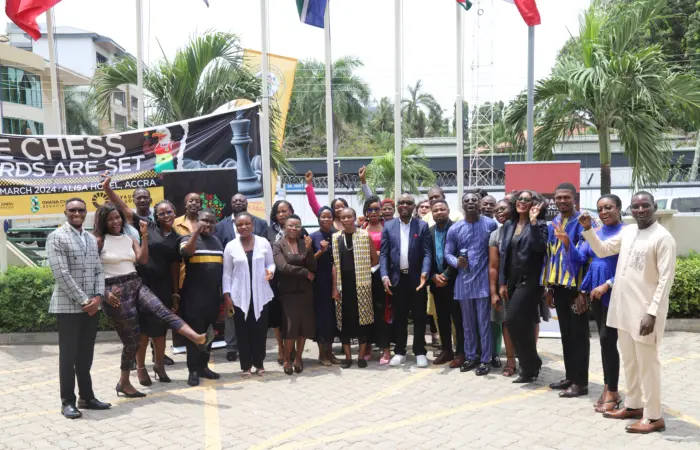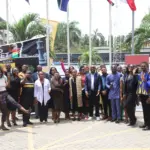Summary
The Independent National Electoral Commission (INEC) had displayed the Preliminary Voter Register (PRV) in its offices and public spaces across the 774 Local Government Areas, Wards/Registration Areas, and polling units nationwide, from November 6th to November 12th, 2018. The exercise was conducted in line with the provisions of Section 19 of the Electoral Act, 2010 (as amended) which mandates INEC to (by notice, appoint a period not less than 5 days and not exceeding 14 days) to display a copy of the (preliminary) Voters’ Register (form EC1A) for each Local Government Area Council or Ward in the Federation for public scrutiny.
Display of the Preliminary Register of Voters (PRV) involves INEC publicly displaying the PRVs to give the public the opportunity to review the PRV. The display exercise provided an opportunity for voters to review the Preliminary Register of Voters (PRV) and bring to the attention of the electoral officials any problems with the register of voters so that they can be corrected, thereby enhancing the quality of the final register. By law, INEC is only required to display the preliminary register of voters at the Local Government, Area Council or ward level. INEC extended the display of the PRVs to the Polling Unit (PU) level.
While INEC is commended for significantly expanding public access to the display process by posting the preliminary register of voters at registration centers and in most instances, the polling unit level, however, there was no INEC officials in sight in some of these locations to provide information on the process to voters.
YIAGA AFRICA’s Watching The Vote (WTV) observers deployed on November 9th and November 12th across the 774 LGAs and the 36 states and the FCT to observe the display claims and objections at the polling units or wards that are close to their place of domicile.
YIAGA AFRICA received 284 reports. 124 reports were received on November 9th and 160 reports were received on November 12th. Based on the reports, WTV found that:
- Generally, there was low turnout throughout the exercise;
- INEC displayed the PRVs in all the polling units visited;
- There was the lack of or no inadequate information about the process as most people were not aware of the process, and some of those who visited the polling units were not aware of where to visit to make their claims or objections;
- While the display at the PU level is commendable, most of these centers had no INEC officials to attend to people who were seen cross-checking their information or to provide guidance on the Display Claims and Objection procedures;
- In some centers, pages of the PRVs were seen littered around or torn. In PU 001 Ward 6 in PHA LGA of Rivers State, the PRV forms displayed by INEC were torn twice by unknown persons. In NKST Primary School, In Kwande LGA of Benue State, we received reports that the PRV fell off the walls as a result of the rains and were littered all around the vicinity;
- INEC officials were seen mostly at the ward level;
- Due to the ongoing insurgency in Borno, public display of the PRV was not done in some LGAs. Reports from Guzamala LGA shows that there was no display of the PRV in the LGA. The LGA INEC office is currently operating in Maiduguri;
- A village in ward 4 in Emohua LGA of Rivers State was not accessed by INEC Officials due to the demand of N5000 and St. Remy by a man who claimed to be the prince of the village;
- There were reports that some people saw names of their dead relatives on the list but they had no idea about how to get names deleted from the preliminary register;
- Security personnel did not deploy to all polling units that WTV observers visited;
- None-deployment of security in most polling units/centers in Yobe State may have contributed to the low turnout.
- Political parties did not deploy their agents to the polling units;
- No one was prevented from scrutinizing the PRVs;
- No one raised a challenge to have a registration deleted because the person is not a Nigeria, is not up to up to 18, the person is dead, or the person has registered more than once in the polling units/wards observed.
Methodology
YIAGA Africa’s #WatchingTheVote deployed trained observers across all the 774 LGAs and the 36 states and the FCT. WTV observers were trained on how to observe the display claims and objection procedures and on how to report their findings to the WTV National Data Center (NDC).
WTV Observers observed on two selected days. They deployed on November 9th and on November 12th. WTV observers spent a minimum of two (2) hours at each of the centers that they deployed to observe.
Each observer called or sent in their observation findings to WTV National Data Center. WTV received a total of 284 reports, these reports were reviewed, verified and analyzed.
Observations and Findings:
Just like the display claims and objections exercise that took place in March 2018, the exercise held in November 2018 just a few months to the 2019 general elections recorded abysmal participation of citizens which may be attributed to the poor publicity of the exercise on the part of INEC and a not clear communication on the procedures.
We received reports of persons who crossed off names of their dead relatives on the PRVs or wrote Rest in Peace against the names of their dead relatives out of respect for the dead and ignorance of how to go about the process of deleting names of the dead from the registered.
Others were apathetic because according to them, not only is the process of claims and objections ambiguous, it is cumbersome and tedious.
The just-concluded display claims and objections have further exposed the manpower and capacity gaps of INEC as they only deployed staff to the wards and LGA offices and some of these staff lacked the capacity to take the registrants through the processes of completing the forms for claims and objections.
WTV Findings reveals that:
Display of the PRV
- The preliminary register of voters was displayed conspicuously in all the centers that WTV observers visited;
Turnout of Registrants
- Generally, registrants were apathetic towards the process as turnout was abysmally low;
Deployment of INEC officials
- No INEC official was seen in all the polling units that WTV observers visited, however, on the average two (2) INEC officials were seen in some of the wards that WTV observers visited;
Instruction on the Procedures for Display Claims and Objections
- INEC officials were not seen in most of the polling units visited and reports further revealed that registrants were not informed about the procedures especially on how to make claims and objections.
INEC Essential Forms
- Reports by some observers who deployed to the wards reveal that essential materials such as the forms for the statement of addition, statement of correction, statement of deletions, statement of corrections or insertion, statement of inclusion, statement of death, statement of returns, statement of actions were available.
Deployment of Party Agents
- No political party agents were seen in all the centers that WTV Observers visited.
Deployment of Security
- No security personnel were seen in all the centers that WTV Observers visited.
Deployment of Security
- No security personnel were seen in all the centers that WTV Observers visited.
Scrutinizing/Confirmation Details on the PRV
- No one was prevented from confirming their details in all the centers that WTV observers visited.
Challenge to delete a registration because the person is not a Nigerian
- No challenge was raised to delete a registration because the person is not a Nigerian, in all the centers that WTV observers visited.
Challenge to delete a registration because the person was believed not to be 18 years old
- Because INEC officials were not in the polling units that WTV visited, no challenge was raised to delete a registration because the person was believed not to be 18 years old, in all the centers that WTV observers visited.
Challenge to delete a registration because the person was believed to be deceased
- No challenge was raised to delete a registration because the person was believed to be deceased, in all the centers that WTV observers visited. This was largely because registrants were oblivious of how and where to make complaints.
Challenge to delete a registration because the person was to have registered more than once
- No challenge was raised to delete a registration because the person was believed to be have registered more than once in all the centers that WTV observers visited.
Disruption of the claims and objections process
- There was no attempt to disrupt the claims and objections process in all the centers that WTV observers visited.
Intimidation and Harassment
- There was no attempt to intimidate or harass voters, INEC officials or observers during the claims and objections process in all the centers that WTV observers visited.
Conclusions and Recommendations
While reports from WTV Observers revealed that the display claims and objections took place nationwide from November 6th to November 12th, 2018 and that INEC went the extra mile beyond the constitutional provision of conducting the exercise at the LGA level by displaying at wards and polling units, such effort was made futile by the low level of awareness created about the exercise. There is no overemphasizing the need to increase public enlightenment on the exercise in the future. WTV, therefore, makes the following recommendations to help improve the quality of the electoral process:
To INEC:
- As noted in our interim report on the PRV process issued on April 09, 2018, there is need to explore all communication channels to keep voters and the general public abreast of the activities of the commission. INEC should make the most of communication tools including traditional and social media for effective communication. Information should be clear and unambiguous about every aspect of the process and the required action to be taken by citizens.
- There is a need for increased deployment and monitoring of INEC staff for such important exercise in the future. It is imperative that INEC improves on its arrangements and training of its personnel to assist those who wish to make claims and objections and ensure adequate deployment of personnel to all location where the PRVs are displayed for public scrutiny. It is also important that the commission improves on its monitoring of the exercise at the various levels in order to ensure compliance of its staff to the extant laws and procedures.
- The Commission should intensify its collaboration with security agencies to ensure deployment of security personnel to the centers where the PRVs are displayed in order to curb vandalism and tearing of the PRVs.
- The Commission should be transparent and share its finding from such exercise with the public. There is a need to also provide accessible mechanisms for the citizens to report cases of disenfranchisement and fraud during the display claims and objections process as well as other pre-election processes.
- To encourage more participation, the commission should consider extending the period of the exercise from the traditional 5 days. The Electoral Act, 2010 (as amended) provides for a period not less than 5 days and not exceeding 14 days.
To the Civil Society Organizations
- The Civil Society Organizations should increase efforts to create enlightenment concerning electoral processes, most especially at the grassroots level. This will increase the efficiency of such exercises and build citizens confidence.
- There is the need for observer groups to deploy observers to observe every aspect of the pre-election processes. This will help in ensuring accountability and providing information about the conduct of the process.
To the Political Parties
- It is important that political actors deploy their representatives to observe the pre-election observers to enhance the process.
To the Security Agencies
- It is important that political actors deploy their representatives to observe the pre-election observers to enhance the process.
To the Citizens
- Security agencies should increase collaboration with other organs of government such as INEC and ensure deployment of their personnel to provide security for every aspect of the electoral process.
____________________________________________________________________________
Hussaini Abdu PhD Samson Itodo
Chair, Executive Director
YIAGA AFRICA WTV Working Group YIAGA AFRICA
For media inquiries please contact:
Moshood Isah: Tel. +234 (0) 703 666 9339
Email: misah@YIAGA AFRICA.org
Learn more about #WatchingTheVote at www.watchingthevote.org or on social media on Facebook at facebook.com/YIAGA AFRICA.org or on Twitter @YIAGA AFRICA.
About YIAGA AFRICA
YIAGA AFRICA is a non-governmental organization promoting democracy, constitutionalism and youth participation in Africa. YIAGA AFRICA achieves its goal through research, capacity development and policy advocacy. YIAGA AFRICA operates as a citizens’ movement poised with the onerous mandate of enhancing the quality of democratic governance, public accountability and civic participation. YIAGA AFRICA has been involved in election observation since 2007 and it is one of the leading organizations working on elections in Nigeria.
The YIAGA AFRICA Watching The Vote (WTV) is a citizen-led election observation initiative aimed at enhancing the integrity of elections in Nigeria using technological tools like SMS and evidence-based research methodology tools for election observation. The initiative is designed to promote credible elections and boost citizens’ confidence in the electoral process through citizens observation of electoral activities in the electoral cycle. YIAGA AFRICA is enhancing the quality of democracy in Nigeria using Watching The Vote as a platform for promoting cutting-edge electoral policies, credible elections, civic participation and democratic consolidation.




